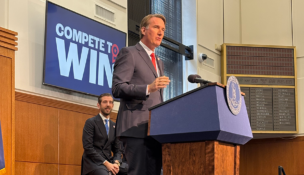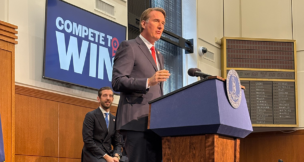McAuliffe plan calls for more oversight and gubernatorial control of VEDP
McAuliffe plan calls for more oversight and gubernatorial control of VEDP
Editor's note: This story has been updated.
Gov. Terry McAuliffe said Monday that he will introduce legislation in the 2017 General Assembly to strengthen oversight, accountability and management at the embattled Virginia Economic Development Partnership (VEDP), the state’s primary business recruitment agency.
The recommended changes would give the governor more control over what is now an 18-member volunteer board, a move that current VEDP board chairman Dan Clemente said would “politicize and destabilize the board,” whose members are already appointed by the governor. He also took issue with McAuliffe's recommendation to make the state's secretary of commerce and trade the board's chairman.
The governor noted in a statement that “VEDP is run by a volunteer board that is responsible for making decisions about the organization’s future, including hiring its CEO. That situation can lead to a lack of accountability when difficulties arise, like those we have seen presented in a recent report by the Joint Legislative Audit Review Commission.”
He was referring to a 132-page, scathing report from the state’s oversight agency released last month. The report detailed an agency hobbled by a lack of vision, a murky marketing plan, unclear performance measures and questionable job data — figures often repeated by the governor in public statements about business growth in Virginia.
JLARC also warned that VEDP’s “unstructured” approach to state incentive grants leaves the state vulnerable to fraud.
Shortly before JLARC released its report, the 100-employee state agency had undergone a recent restructuring to address some concerns, including the tracking of state incentive money. Interim CEO Dan Gundersen implemented the restructuring, a major makeover done without a formal vote of the board since under VEDP’s current structure organizational management falls under the purview of the CEO.
“While it is clear that VEDP executive leadership has undertaken changes to better protect taxpayer dollars, it is clear that more structural changes are needed,’’ the governor said. “… These proposals will add executive oversight to the VEDP board and require the VEDP executive staff to develop long-term operational plans to align the organization’s work with the needs of the Virginia economy.”
McAuliffe thanked Lt. Gov. Ralph Northam, Secretary of Commerce and Trade Todd Haymore and Secretary of Finance Ric Brown for working to develop the legislative proposals.
Besides recommending changes to VEDP’s board, the governor’s plan says the agency needs a Department of Grant Administration and its own internal auditor. Combined, these offices would manage all of VEDP’s administered grants.
Haymore, who now serves on the board as one of six ex-officio state representatives, applauded the plan. “I commend Gov. McAuliffe for proposing legislation to strengthen the oversight and accountability of VEDP,” he said. “I now look forward to working with the governor, Lt. Gov. Northam, and the General Assembly to see these needed improvements and others are implemented so that VEDP will again take its place as the premier state economic development agency in the nation.”
Clemente, a commercial real estate executive from Northern Virginia who has served on other public boards including George Mason University, noted that Gov. McAuliffe has already had two secretarys of commerce and trade during the three years he has been in office. “If you accept my proposal that you need to depoliticize VEDP, by putting the secretary of commerce as chairman you are totally politicizing it. You shouldn't have control of the VEDP by the executive branch.” Plus, with administration turnover, the effect would be destabilizing. … If you are looking for continuity, you need to have people on the board who are going to be there longer than four years.”
McAuliffe’s legislation calls for these changes to VEDP's Board:
· Make the Secretary of Commerce and Trade the permanent chair to professionalize the board and increase executive oversight.
· Increase accountability by shortening board appointment terms from six years to four.
· Align VEDP with each governor’s agenda by structuring appointments to give each sitting governor a majority of the board appointments within the first two years of his or her administration.
· Give the governor the flexibility to get the right board members for the job by eliminating the requirement that every congressional district must be represented through the governor’s appointments.
· Require appointees to have expertise in certain areas of the Virginia economy, including economic development at the regional and local level.
To strengthen VEDP’s organizational management and internal oversight, the legislation would:
· Require VEDP’s CEO to work with the governor at the beginning of each gubernatorial administration to develop a comprehensive economic development policy.
· Require the CEO to develop a comprehensive operational plan that shall be approved by the board and will govern the organization’s day-to-day functions.
· Require the CEO to report to the VEDP board quarterly on the implementation of the organization’s economic development strategic plan and operational plan.
· Create a new division within VEDP to manage and administer all VEDP incentive programs and enforce statutory requirements for the programs.
· Create an internal audit division that conducts periodic audits of VEDP activities and reports directly to the board.
· Clarify VEDP’s role as the commonwealth’s primary economic driver
· Require the VEDP operational plan to include a strategy to coordinate with all state agencies that administer economic development incentive programs to ensure effective use of state incentives.
· Establish a biennial survey of other state and local agencies that engage in economic development activity to assess the effectiveness of VEDP’s coordination with other economic development organizations and the alignment of VEDP’s strategic plan with economic development partners.
· Require the CEO to develop an action plan to respond to and implement appropriate responses of the surveys.
In late November, two weeks after JLARC released its report, VEDP hired a new CEO following an eight-month national search. Stephen Moret, an economic development executive from Louisiana, is scheduled to begin the job on Jan. 1, at an annual salary of $340,000. Moret, now president and CEO of the Louisiana State University Foundation in Baton Rouge, could not be reached for comment regarding how McAuliffe’s proposed legislation might change the job description under which he was hired.
McAuliffe has met Moret and said earlier that he endorsed the board’s hiring decision. “Having met with Stephen, I agree with the board that his executive management experience in both public and private sector economic development roles make him the right choice to lead VEDP at this critical time for the organization,” the governor said at the time.
Ed Gillespie, one of several Republican candidates vying to challenge Northam, the expected Democratic nominee for governor in 2017, took a swipe at the plan. “The McAuliffe-Northam proposal is too little, too late. Their reforms tinker around the edges of VEDP operations and fail to address the more fundamental issues with the administration’s approach to economic development. And these modest changes come three years into the administration and only after an embarrassing public report. This legislative package, like most of the McAuliffe-Northam economic strategy, was designed to be a press release, not a solution,” Gillespie said in a statement.
Gillespie also pointed out in the statement that Northam, an ex-officio member of the VEDP board, ” left early or failed to attend 73 percent of VEDP board meetings before the JLARC report. We can’t change things by electing the same people who’ve been part of the problem.”
-

















